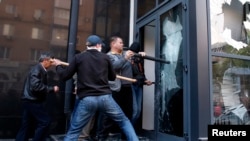KYIV, UKRAINE —
Ukraine expanded its military offensive Saturday against pro-Russia separatists in the country's chaotic east, where European observers who had been held hostage by militants now have been freed. And there is mourning in Odessa, in southern Ukraine, where more than 42 people died Friday during clashes between the two sides.
Ukrainian forces moved into Kramatorsk, a town about 17 kilometers south of Slovyansk, where the offensive began Friday.
Vasil Krutov, the head of Ukraine's Anti-Terrorist Center, reported heavy fighting and casualties but could not offer specifics about how many people were killed or wounded. At a news conference in Kyiv, Krutov said the confrontation in Kramatorsk was developing into a protracted military conflict.
Unfortunately, he said, Ukrainian forces are facing "a very serious aggressor."
"What's happening in Donetsk and across the eastern region is not just a planned short-term action," Krutov told reporters. "It's actually war."
A combustible situation
Local television showed scenes of armored personnel carriers moving through the town, and the country’s Interior Ministry said Ukrainian forces had retaken the security service headquarters.
There also was gunfire reported in Slovyansk, where the military previously encountered fierce resistance from separatist fighters. On Friday, at least nine people were killed there, including two servicemen who died when militants shot down a pair of army helicopters.
Krutov said Ukrainian forces have taken command of all roads leading into Slovyansk.
He said the main concentration of pro-Russian militants - Krutov calls them "terrorists" - is now in Slovyansk. In addition to surrounding the city, Krutov said forces supporting the Kyiv government had taken complete control of radio and TV towers.
Militants who had been holding a group of military observers from the Organization for Security and Cooperation in Europe freed their 12 captives in Slovyansk. Russian media report the hostages - seven Europeans and five Ukrainians - were released after talks involving an envoy sent by Russian President Vladimir Putin.
But uncertainty remains. A resident of Slovyansk who declined to give his name said separatist forces there were rebuilding their defenses. "At this moment," the man said, "nobody is in control of the checkpoints. Local citizens are building back the barricades."
Odessa death toll climbs
In Odessa, the number of casualties from a clash Friday between pro-Russian activists and supporters of the Ukrainian government rose to at least 42. Most of those killed were pro-Russian protesters who’d taken refuge in a building that government activists set ablaze.
The incident in Odessa, a key port city on the Black Sea, was the most deadly since the February uprising that that led to the removal of Ukraine's pro-Russia president, Viktor Yanukovych.
Mourners on Saturday placed flowers near the doors of the charred trade union building. Roughly 2,000 pro-Russian protesters gathered outside, chanting: "Odessa is a Russian city."
The current Ukrainian government and the West believe that the Kremlin is supporting separatists who are destabilizing the country ahead of the planned May 25 elections. Moscow said Kyiv and its Western sponsors were provoking the bloodshed and would bear direct responsibility for it.
Some reporting by Reuters
Ukrainian forces moved into Kramatorsk, a town about 17 kilometers south of Slovyansk, where the offensive began Friday.
Vasil Krutov, the head of Ukraine's Anti-Terrorist Center, reported heavy fighting and casualties but could not offer specifics about how many people were killed or wounded. At a news conference in Kyiv, Krutov said the confrontation in Kramatorsk was developing into a protracted military conflict.
Unfortunately, he said, Ukrainian forces are facing "a very serious aggressor."
"What's happening in Donetsk and across the eastern region is not just a planned short-term action," Krutov told reporters. "It's actually war."
A combustible situation
Local television showed scenes of armored personnel carriers moving through the town, and the country’s Interior Ministry said Ukrainian forces had retaken the security service headquarters.
There also was gunfire reported in Slovyansk, where the military previously encountered fierce resistance from separatist fighters. On Friday, at least nine people were killed there, including two servicemen who died when militants shot down a pair of army helicopters.
Krutov said Ukrainian forces have taken command of all roads leading into Slovyansk.
He said the main concentration of pro-Russian militants - Krutov calls them "terrorists" - is now in Slovyansk. In addition to surrounding the city, Krutov said forces supporting the Kyiv government had taken complete control of radio and TV towers.
Militants who had been holding a group of military observers from the Organization for Security and Cooperation in Europe freed their 12 captives in Slovyansk. Russian media report the hostages - seven Europeans and five Ukrainians - were released after talks involving an envoy sent by Russian President Vladimir Putin.
But uncertainty remains. A resident of Slovyansk who declined to give his name said separatist forces there were rebuilding their defenses. "At this moment," the man said, "nobody is in control of the checkpoints. Local citizens are building back the barricades."
Odessa death toll climbs
In Odessa, the number of casualties from a clash Friday between pro-Russian activists and supporters of the Ukrainian government rose to at least 42. Most of those killed were pro-Russian protesters who’d taken refuge in a building that government activists set ablaze.
The incident in Odessa, a key port city on the Black Sea, was the most deadly since the February uprising that that led to the removal of Ukraine's pro-Russia president, Viktor Yanukovych.
Mourners on Saturday placed flowers near the doors of the charred trade union building. Roughly 2,000 pro-Russian protesters gathered outside, chanting: "Odessa is a Russian city."
The current Ukrainian government and the West believe that the Kremlin is supporting separatists who are destabilizing the country ahead of the planned May 25 elections. Moscow said Kyiv and its Western sponsors were provoking the bloodshed and would bear direct responsibility for it.
Some reporting by Reuters





